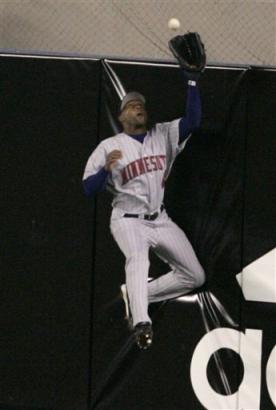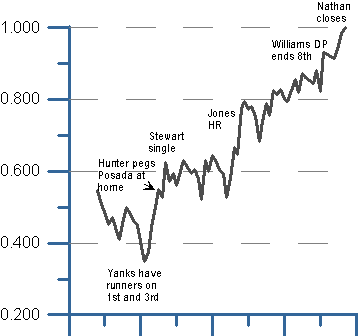October 5, 2004
Game One
It is often said in sports that the mark of true greatness is an athlete who can succeed in critical situations even when clearly not at his best, which is exactly what Johan Santana did against the Yankees last night. Santana, who allowed the fewest baserunners per nine innings in the American League this year, was pitching in trouble almost the entire time. In fact, he didn't complete a single inning without allowing at least one runner to reach safely.
Yet Santana made the big pitches when he needed them, got some extremely lucky breaks, and had some incredibly good defense played behind him. It wasn't pretty and it wasn't the type of dominance Twins fans have come to expect from him during the second half, but the end result was just the same: seven shutout innings.
When Santana was done -- lifted after getting out a jam in the bottom of the seventh having thrown just 95 pitches -- he handed the game over to his bullpen. Juan Rincon pitched a scoreless eighth and Joe Nathan came in to pitch the ninth, pumping 97 MPH fastballs at New York hitters until the game was over. The game no doubt went exactly as Ron Gardenhire had hoped, with Santana for seven innings and Rincon and Nathan for one each. Nice, clean and orderly, and just like that the Twins lead the series 1-0.
Whether nerves were doing damage on his control or he was simply a little off his game, Santana struggled with his command for much of the evening. He seemed to rely on his fastball more often than he typically does, perhaps realizing that his off-speed stuff wasn't quite there. The result was fewer silly swings, fewer missed bats, and a lot more hits. The nine hits Santana allowed were the second-most he's given up in 35 starts this season. But he was able to get out of jams each and every time, getting double plays, outstanding catches and pinpoint throws so many times that I thought the Twins were the team with Mystique and Aura on their side.
Aside from Santana, the heroes from Game 1 were Shannon Stewart and Torii Hunter. Stewart went 2-for-4, drove in the Twins' first run, and made a leaping catch to save Santana in the second inning. Hunter collected a single in four at-bats, but it was what he did in the field that was special. With Jorge Posada on third base, John Olerud at the plate and one out in the second inning, Hunter came charging in on a shallow fly ball, made the catch, and fired a one-hop strike to Henry Blanco to nail the tagging Posada at home plate.
Then in the eighth inning, Alex Rodriguez blasted Rincon's first pitch of the game to deep center field. Hunter tracked the ball in a full on sprint, timed his jump perfectly, robbed Rodriguez of at least a double and perhaps a homer, and then went crashing into the wall.

Instead of the Yankees having momentum, Rincon being in trouble and the score perhaps being cut to 2-1, the Twins were just one out closer to victory. It was nothing Twins fans haven't seen from Hunter before, but he was certainly at his fearless best, doing whatever was necessary to turn fly balls into outs, even when it meant going up against a wall in an ongoing battle he will proudly never win.
As you can see from the following graph of the Twins' "Win Expectancy" throughout Game 1, it was on those few crucial plays that the game was won.

What that shows is essentially how often a team in Minnesota's exact situation -- using who was on base, how many outs there were, and what inning it was -- have ended up winning the game. When the Yankees had runners at the corners in the bottom of the second inning, the Twins were suddenly in very rough shape, underdogs in the game, but Stewart's catch and Hunter's catch-and-throw saved them.
One of the biggest plays of the game as far as the impact on Win Expectancy was actually a non-play, as Ruben Sierra's foul ball that was initially called a home run before being overturned resulted in a huge swing of 0.2 (or a 20% likelihood of New York winning). Breaking the play-by-play Win Expectancy information down even futher, we can actually look at how much each player contributed to his team's win or loss.
WE
Santana .228
Stewart .129
Hunter .078
Nathan .077
Mussina .071
Rincon .040
Jones .036
Gordon .022
Guzman .018
Rivera .015
Cuddyer .011
Sheffield .006
Blanco .002
Koskie -.009
Matsui -.014
Rodriguez -.015
Olerud -.028
Cairo -.037
Ford -.076
Morneau -.080
Posada -.104
Jeter -.119
Sierra -.120
Williams -.134
What will probably be ignored in the midst of Santana's shutout innings and the great performances by Stewart and Hunter is the fact that New York's starter, Mike Mussina, pitched a pretty great game himself. Actually, Mussina seemed to be more on his game than Santana, going seven innings while allowing two runs on seven hits and striking seven.
Another big play occurred with the game tied in the bottom of the first inning, as the Yankees had runners on first and second with one out. With Bernie Williams at the plate, FOX announcer Tim McCarver uttered what has to be the leader in the clubhouse for Dumbest Statement of the Postseason, saying, "Joe Torre can start the runners here because there's a contact pitcher on the mound."
Some of you may be aware of the fact that the pitcher on the mound was Santana and he led the American League with 265 strikeouts this season, striking out 30.1% of the batters he faced and getting nearly 10.5 strikeouts per nine innings pitched. Sure enough, when Torre sent the runners on a 3-2 pitch, Santana got Williams to strike out on a changeup and Blanco threw Rodriguez out at third by 10 feet. The inning was over and the first of what turned out to be many threats was averted.
Tonight, the Twins will attempt to do what they couldn't last year, which is capitalize on a Game 1 victory at Yankee Stadium and take control of the series by winning Game 2. Like last year, it'll be Brad Radke trying to put the Twins up 2-0. If he pitches as well as he did then, giving up just one run through six innings before falling apart in the seventh, you've got to like the Twins' chances. Instead of going up against Andy Pettitte, his opponent this time will be Jon Lieber.
Today at The Hardball Times:
- Playoff Preview: Braves - Astros (by Aaron Gleeman)
- Misunderstood Angels (by Ben Jacobs)
- Double (Play) Trouble (by Larry Mahnken)
*****Comments? Questions? Email me!*****

